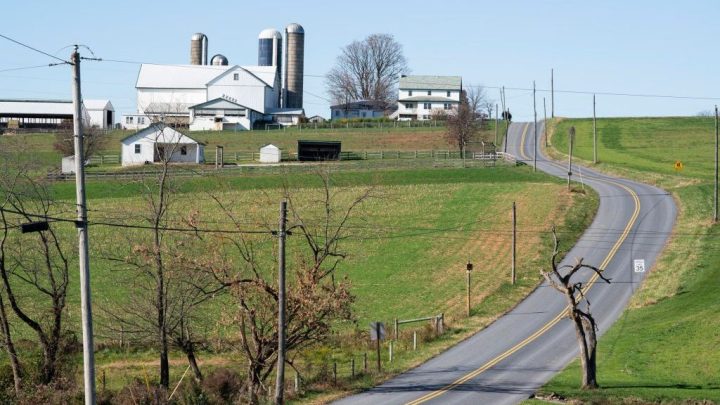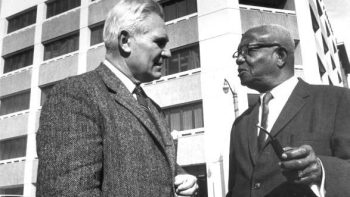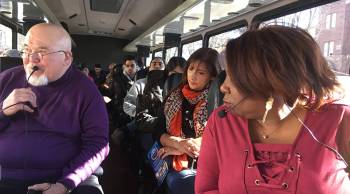
In “American Ramble,” a 26-day walk reveals a “profoundly different” nation
In “American Ramble,” a 26-day walk reveals a “profoundly different” nation

A couple of months after the Jan. 6 insurrection, Neil King Jr., a journalist and D.C. resident, decided to take a trip.
“I just thought one morning, what if I just walked to New York? How would the pedestrian fit into that territory? It’s one of the most trampled, overrun parts of the country,” King said during an interview with “Marketplace” host Kai Ryssdal. “What if I just walked out my door and looked at it really slowly and up close, and kind of let that territory tell its story? And so that’s what I did.”
King embarked on a 330-mile journey over the course of 26 days all the way up to Manhattan. His walk took him through Pennsylvania’s Lancaster County, past the New Jersey Turnpike and even to the summit of a landfill.
In “American Ramble: A Walk of Memory and Renewal,” King describes his journey and the many things he came to understand about the state of the country and its economy. The following is an excerpt from the first chapter of the book, at the beginning of King’s walk. To listen to King’s conversation with Ryssdal, click the audio player above.

Our house stands along a row of white maples nine blocks east of the U.S. Capitol, as it has since Ulysses Grant was president. Tens of thousands of times in our twenty-two years there I have opened the wrought-iron gate between the garden and the sidewalk for trips to work, dog walks, early runs, quick jaunts to the store for a clutch of bananas, or with daughters in hand on a Christmas morning.
This trip was different. On a fresh morning in late March, I stepped past the threshold of our front door, tugged the garden gate closed behind me, and set off to walk to the city of New York. A slow stroll, I liked to say, down a fast lane. An easy walk along a founding swath of the country that most travelers want to put behind them. A congested landscape usually seen as a blur, along a corridor named for a train, the Acela, whose name in turn is a faster form of accelerate. Ad + celerare, from the Latin: toward something, whatever it is, swiftly; to hasten the occurrence of a thing you want over.
No hastening anything on this trip. I wanted nothing over. I kissed my wife, Shailagh; said goodbye to my brother Jeff; scratched my Airedale behind the ear; and turned north. I was off to talk to America, to listen to her, to examine her, to wonder over her, at what we all hoped was the end of one of the roughest patches in our history. I wanted to think about what we are, and once were, and still yearned to be. To poke among the graveyards of our past and brush the moss off forgotten things. To chew over this American project and come to some hazy conclusion over whether America was still possible or had seen its best days.
I wanted to dip into the deep pockets of our national memory, to pause with families rooted in place over centuries. To touch the aboriginal images carved in stone and hold in my hands the sacred books that speak to our beginnings. Most of all I just wanted to walk, breathe, feel the legs underneath me, and take in the days as the sun arced overhead.
I had had my own upheavals, too, after a cancer welled up and fogged my future. So I wanted to go measure my own time against the many timekeepers I would pass along the way. The homesteads gone to seed. The tottering barns. The church clock towers. The decaying edges of cities. The valleys carved by a million years of flowing water.
People looked at me askance when told of this lark. They were repelled, I think, by the mere idea of walking this stretch of ground. They saw a stooped figure skulking past the wharves of Baltimore and treading along the shoulder of Interstate 95. They saw a tall man with graying hair tossed in the lee of careening semis and grubbing for Cinnabons at the Molly Pitcher Service Area.
“And for what purpose?” they would ask.
“Purpose?” I said to one baffled inquirer over dinner one evening, a decorator of Georgetown sitting rooms. We were dining at a table for six. It was winter. Snow fell outside. “To walk until I summon forgotten thoughts. To assay the landscape and the state of mind of the citizenry. To measure distance by footfall. To take in a horizon that is impossibly far away, and then put it behind me.” Those were roughly my words, anyway.
“Oh, so you hope to clear your head” was her response.
“You could say that.”
Truth is, there was no concise encapsulation of the purpose for this walk. One could summon Buddha or Wordsworth or Thoreau’s humble paddling on the Concord and Merrimack rivers. One could note that Thoreau never once paused to explain the purpose of his paddle that later became his first gem of a book, A Week on the Concord and Merrimack Rivers. All that the Concord River contained—the “occasional logs and stems of trees,” the shining pebbles, the floating cranberries—“were objects of singular interest to me,” he wrote, “and at last I resolved to launch myself on its bosom and float wither it would bear me.”
To which I said, “Precisely.”
My intent, like his, was to take a singular interest in all I encountered. To turn my attentions away from the noxious chatter of Washington, the tribal feuding on television and computer screens, and care only for the particularities I found along the way. To shrink my horizons to that of a walking man and to root my views of the world in what I encountered step by step. To honor and respect what I saw.
“Attention,” the late poet Mary Oliver wrote, “is the beginning of devotion.”
I had obsessed for months over so much that seemed relevant to this walk. The remaining traces of the earliest people, the Algonquin and Lenape and all the others. The first mapping of the land. The flow here and there of the Dutch, the Swedes, the English, Germans, Scots Irish. The fleeing streams of men and women escaping slavery, and later Jim Crow. The battlefields I would pass through and the routes the soldiers took coursing this way and that. The felling of the trees, the tilling of the land and the killing of its wildlife to where barely a bird remained. How brawny men made the steel and laid the tracks for the trains to run. How the native trails turned into cart tracks, stage routes, toll roads, and finally into the highways I would skirt as I made my way north.
My walk was, in reality, its own explanation. You embark on a long solitary stroll in part so as not to explain it. You go to cast aside all such distractions. You go for the fun of it, the promise of pure serendipity, and simply because you can, as though the entire way there you should walk beneath a red banner of freedom, with trumpets tooting, like some footloose believer drawn by the lure of Jerusalem. Possum ergo faciam—I can, therefore I will.
From “American Ramble: A Walk of Memory and Renewal.” Copyright © 2023 by Neil King Jr. Reprinted by permission of Mariner Books, an imprint of HarperCollins Publishers.
There’s a lot happening in the world. Through it all, Marketplace is here for you.
You rely on Marketplace to break down the world’s events and tell you how it affects you in a fact-based, approachable way. We rely on your financial support to keep making that possible.
Your donation today powers the independent journalism that you rely on. For just $5/month, you can help sustain Marketplace so we can keep reporting on the things that matter to you.


















